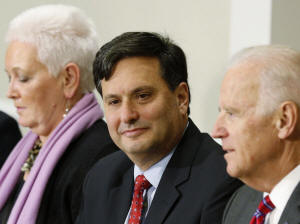Biden chief of staff says hack response will go beyond 'just sanctions'
 Send a link to a friend
Send a link to a friend
 [December 21, 2020]
By Raphael Satter [December 21, 2020]
By Raphael Satter
WASHINGTON (Reuters) - The incoming White
House chief of staff said on Sunday that President-elect Joe Biden's
response to the massive hacking campaign uncovered last week would go
beyond sanctions.
Ron Klain said Biden was mapping out ways to push back against the
suspected Russian hackers who have penetrated half a dozen U.S.
government agencies and left thousands of American companies exposed.
"It's not just sanctions. It's steps and things we could do to degrade
the capacity of foreign actors to engage in this sort of attack," Klain
said on CBS' "Face the Nation."
Options being mulled by the Biden administration to punish Moscow over
its alleged role include financial penalties and retaliatory hacks on
Russian infrastructure, people familiar with the matter have told
Reuters.
The Kremlin denies any role in the hacking. Speaking at an event to
commemorate the 100th anniversary of Russia's SVR foreign intelligence
agency, Russian President Vladimir Putin praised its work, saying he was
impressed by the "difficult professional operations that have been
conducted."

Biden, who becomes president on Jan. 20, would likely have bipartisan
support for a muscular reaction to the espionage campaign, lawmakers
indicated on Sunday.
Republican Senator Mitt Romney said the data breach was "extraordinarily
damaging" on NBC's "Meet the Press."
"This demands a response," he said. "This is something we have to
address as soon as possible."
U.S. Senator Mark Warner, the top Democrat on the Senate Intelligence
Committee, said on ABC that the hack could still be going on and that
officials had yet to determine its full scope. But he stopped short of
the aggressive language used by Romney, who called the hack "an
invasion".
"This is in that gray area between espionage and an attack," Warner
said. Still, he backed Romney's call for retaliation, saying Washington
needed to make clear to adversaries "that if you take this kind of
action we and others will strike back."
[to top of second column]
|

Ebola Response Coordinator Ron Klain (C) listens to U.S. Vice
President Joe Biden (R) while seated next to Special Assistant to
the President Gayle Smith (L) as they meet with organization leaders
that are responding to the Ebola crisis while in the Eisenhower
Executive Office Building on the White House complex in Washington,
November 13, 2014. REUTERS/Larry Downing

Adam Schiff, the Democratic chair of the House Intelligence
Committee, also said the United States would "have to deter and
respond" - but also invest more in cyber defenses.
He told MSNBC that, in some cases, the digital cleanup of U.S.
networks "may mean burning down the whole system in order to make
sure when we rebuild it they're not present."
Officials and cybersecurity professionals across the United States
are still struggling to get their hands around the scale of the
hacking campaign, which used U.S. tech company SolarWinds as a
springboard to infect the Texas firm's clients - including the
Departments of Treasury, Commerce and Energy.
Up to 18,000 customers were left open to the hackers, but CEO Kevin
Mandia - whose company FireEye helped uncover the hacking - told CBS
that he estimated "only around 50 organizations or companies,
somewhere in that zone," were "genuinely impacted."
Klain told CBS much was still unknown.
"I think there's still a lot of unanswered questions about the
purpose, nature, and extent of these specific attacks," he said.
(Reporting by Idrees Ali, Susan Heavey, and Raphael Satter; Writing
by Raphael Satter and Scott Malone; Editing by Sonya Hepinstall,
Lisa Shumaker and Daniel Wallis)
[© 2020 Thomson Reuters. All rights
reserved.] Copyright 2020 Reuters. All rights reserved. This material may not be published,
broadcast, rewritten or redistributed.
Thompson Reuters is solely responsible for this content.
 |